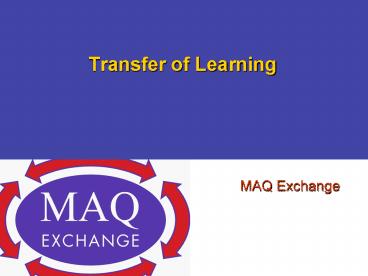Transfer of Learning - PowerPoint PPT Presentation
1 / 19
Title:
Transfer of Learning
Description:
Describe transfer of learning and why it is important ... Appropriateness of the materials and resources. Transfer of Learning. 19. Summary ... – PowerPoint PPT presentation
Number of Views:1964
Avg rating:3.0/5.0
Title: Transfer of Learning
1
Transfer of Learning
- MAQ Exchange
2
Objectives/Major Concepts
- Describe transfer of learning and why it is
important - Discuss factors that affect transfer and learner
performance - Describe key strategies that can be used before,
during and after training - Discuss issues related to monitoring and
evaluating learning transfer
3
Why do we do training?
- To ensure workers have the knowledge and skills
to do the job.
4
What is Transfer of Learning?
- ensuring that the knowledge and skills acquired
during a learning intervention are applied on the
job
5
Why focus on transfer?
- Improves quality of client services
- Protects training investments
- Encourages and empowers learners
- Improves accountability for implementation
- Enhances likelihood that interventions will
target specific needs - Helps supervisors keep current
6
What are the barriers to transferring learning?
- Lack of reinforcement on the job
- Difficulties in the work environment
- Non-supportive organizational culture
- Learners perception that new skills are
impractical - Learners discomfort with change
- Separation from the instructional source
- Poor instructional design and delivery
- Negative peer pressure
Source Newstrom 1983.
7
What is my greatest performance block?
- I would perform better if
- 1. I knew exactly what was expected of me.
- 2. I received regular feedback about how I was
doing, compared to what was expected. - 3. I had the right tools to do my job and a work
environment that suited my job. - 4. I had some incentives to excel (e.g.,
recognition). - 5. I had better skills and knowledge about how to
do my job. - 6. I had a supportive supervisor or manager.
Adapted from Stolovitch and Keeps 1999.
8
Performance Factors Matrix
Adapted from Stolovitch and Keeps 1999.
9
What performance factorsaffect transfer of
learning?
- Job expectations
- Performance feedback
- Physical environment and tools
- Motivation
- Skills and knowledge
- Organizational support
10
What is the TOL process?
- an interrelated series of tasks performed by
supervisors, trainers, learners and co-workers
before, during and after a learning intervention
in order to maximize transfer of knowledge and
skills and to improve job performance
11
The Transfer of Learning Matrix
43 suggested strategies
12
Action Plan
- Describes steps to maximize transfer of learning
- Used by learner, supervisor, trainer and
co-workers - Helps track expectations, commitments and
resources - Initiated before training, refined during
training and implemented after training
13
Action Plan Key Elements
14
Key Strategies
- Before Learning
- Ensure problem can be fixed with training
- Select the right trainees
- Establish agreements about intervention goals
15
Key Strategies (continued)
- Before Learning (continued)
- Design the learner support system learning
materials interactive activities
facilitators/peers administrative support
16
Key Strategies (continued)
- During learning
- Match training activities to intervention goals
- Give learners the time to learn
17
Key Strategies (continued)
- After learning
- Provide ongoing support and resources
- Monitor learner progress
- Make adjustments as needed
18
Measuring the Effectivenessof Learning
Interventions
- Performance on the job
- Success of approach
- Appropriateness of the materials and resources
19
Summary
- Transfer of learning is important in maximizing
the effect of training - There are a number of factors that affect
transfer and learner performance - There are key strategies that you can use before,
during and after training - Monitor and evaluate learning transfer to
document that transfer has occurred































